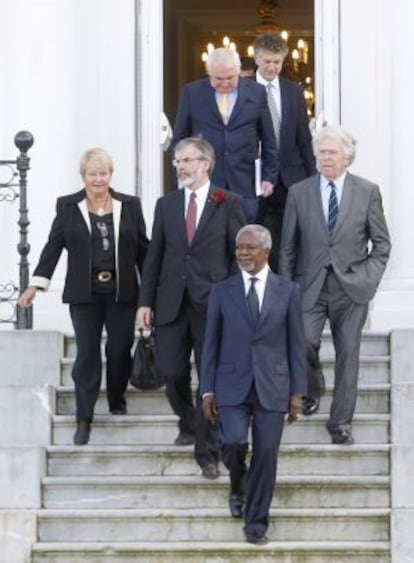International mediators fail to fix timescale for full ETA disarmament
Second San Sebastián conference proposes concessions for terrorist inmates

Eighteen months after ETA declared a definitive end to violence, international mediators met for a second time in San Sebastián on Monday in an attempt to draw up a route map toward the final dissolution of the terrorist organization through new proposals on disarmament, prisoners, human rights and recognition of victims.
The second Aiete palace summit did not generate the same level of expectation as the 2011 Donostia-San Sebastián International Peace Conference, which was attended by former UN Secretary General Kofi Annan and several European ex-prime ministers. But it was seen as a chance to breathe new life into a process that has been stalled since the first meeting in October 2011.
ETA has made little headway in addressing the three main points of a desired peace process: disarmament; repentant terrorists leaving ETA prisoners’ collective EPPK and joining the “Nanclares path” to individual reinsertion; and recognizing the harm caused to victims. The terrorist organization has accused Spain’s Popular Party (PP) government of blocking the process by refusing to enter direct negotiations and pressuring the Norwegian government to expel its leadership in February. ETA, meanwhile, maintains a policy of amnesty that the government rejects on constitutional grounds.
“We recommend the drawing up of a controlled, ordered and consensual process that will lead to the disarmament and dismantling of ETA’s military structures,” read the first conclusion of the Aiete summit, instigated by Basque social movement Lokarri and the result of a Social Forum meeting on March 14 and 15 attended by the Basque Nationalist Party and abertzale grouping Sortu, as well as Brian Currin’s International Contact Group and the UNESCO chair of civic responsibility, pluralism and coexistence, among others.
The 12-point document did not lay out a timescale for disarmament, what form it should take, or the role to be played by the Spanish and French governments. The second point alluded to a “reasonable time” for a process that would be carried out under the supervision of independent observers.
Not all of the points were demands on ETA. The document also recommends “applying justice in a transitional manner,” the revocation of the Parot Doctrine (which allows for the de facto extension of ETA prisoners’ sentences), reviewing the cases of seriously ill inmates, and ending the practice of scattering convicted ETA members throughout jails across Spain and outside the Basque region.
The Basque regional government said before the summit that it would back the recommendations “if they represent a step forward.” However, it also pointed to the breakdown of a similar proposal last June when internal dissent among ETA prisoners, upon whom the abertzale had placed its faith to issue a statement regarding individual reinsertion, brought the plan to nothing.
Nonetheless, the mediators said they hoped ETA prisoners “would play an active role” in the new peace plan while noting that “there is no place for impunity because it goes against the principles of justice, truth and reparation and the rights of the victims.”
Ministry denies report on ETA return
The Interior Ministry this week denied it was in possession of intelligence reports predicting ETA’s return to violence or the emergence of a splinter group intent on launching an attack. The ministry’s statement came in response to High Court prosecutor Carlos Bautista’s assertion on Monday that Jorge Fernández Díaz’s department was holding such files.
In their periodic reports on ETA submitted in April, neither the Civil Guard nor the CNI intelligence agency concluded that the group was currently operational at any level. The National Police Corps, though, stated its belief that ETA might be merely dormant and planning some form of attack.
During the trial of suspected ETA member Josetxo Ibazeta for making terrorist threats, Bautista said the documents supposedly held by the ministry indicated that the stalled peace process might lead ETA to take up arms again. The prosecutor made his assertion when defense lawyers asked for the identity of three protected witnesses to be revealed, saying they were under “no risk” of reprisals.
Hours later the ministry issued a statement saying it had received no report from the security services that concluded “emphatically that ETA will strike again,” or of the emergence of a splinter group.
Tu suscripción se está usando en otro dispositivo
¿Quieres añadir otro usuario a tu suscripción?
Si continúas leyendo en este dispositivo, no se podrá leer en el otro.
FlechaTu suscripción se está usando en otro dispositivo y solo puedes acceder a EL PAÍS desde un dispositivo a la vez.
Si quieres compartir tu cuenta, cambia tu suscripción a la modalidad Premium, así podrás añadir otro usuario. Cada uno accederá con su propia cuenta de email, lo que os permitirá personalizar vuestra experiencia en EL PAÍS.
¿Tienes una suscripción de empresa? Accede aquí para contratar más cuentas.
En el caso de no saber quién está usando tu cuenta, te recomendamos cambiar tu contraseña aquí.
Si decides continuar compartiendo tu cuenta, este mensaje se mostrará en tu dispositivo y en el de la otra persona que está usando tu cuenta de forma indefinida, afectando a tu experiencia de lectura. Puedes consultar aquí los términos y condiciones de la suscripción digital.








































